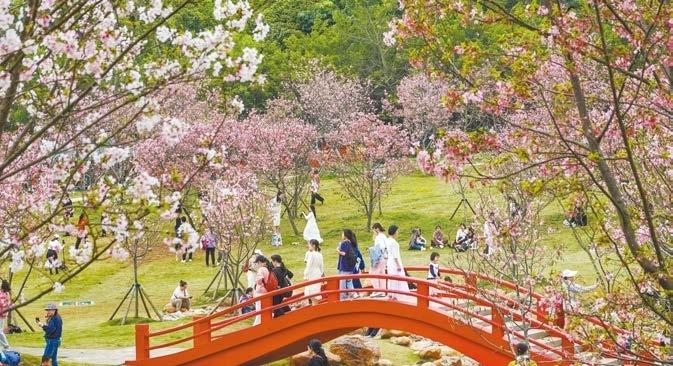
THIS spring, young parents living in major cities in China are flocking to the suburbs to enjoy their two-day vacations at hotels and resorts, representing a new trend of traveling. In Shenzhen, a Chinese father surnamed Li no longer worries about finding places to take his daughter on weekends since experiencing a delightful getaway with his family at a local five-star hotel two years ago. “The moment we opened the room door, my daughter was instantly captivated by the welcome sign placed inside. Besides, it was incredibly fun for us to search for the hidden gift prepared by the hotel,” Li recalled. He said that the buffet of the hotel not only offered seafood and steak but also foods loved by children. There were also activity areas where kids could enjoy themselves, which can free parents from childcare. Just like Li, an increasingly large group of middle-income Chinese parents in first-tier cities are taking fine hotels and resorts as their go-to choice on weekends. According to Ctrip, China’s leading online travel platform, in 2023, family travelers accounted for nearly 40% of users booking high-end star hotels. Additionally, the number of high-end star hotel orders from family travelers increased by 121% compared to the previous year. “I’m stocking up on hotel reservations,” said a Chinese mother called Flora, clicking rapidly on a purchase link as the countdown on a booking platform ticked away. Having visited various resorts in the Yangtze River Delta region multiple times, Flora knows a lot about discounts. While the resorts don’t come cheap — the room rates often exceed 1,000 yuan (US$139) per night during peak seasons, and it’s not unusual for a two-night stay to cost over 3,000 yuan — their appeal seems undeniable. Historically, hotels were seen as mere pit stops during travel, primarily offering accommodation. However, this perception is gradually changing in China as a number of resort hotels and unique homestays become key destinations for Chinese tourists. For many vacationers, the initial motivation to travel now is to experience these hotels’ services. In addition, with the acceleration of life’s pace, short-term breaks between busy urban routines have gradually become indispensable for many Chinese parents, helping them to balance work and life better, rejuvenate energy, and discover new joys of life. A 2024 report released by the China Tourism Academy showed that weekend tourists accounted for more than 41% of the annual tourist flow in China, indicating the prosperous development of the weekend leisure tourism market. Figures from Meituan, one of China’s leading e-commerce platforms for services, indicated that the proportion of family travelers in major tourism scenarios in China had been steadily rising and reached 18.2% in the first half of 2024, a 6.4% increase compared to the same period in the previous year. Seizing this trend, authorities are making efforts to stimulate China’s tourism consumption by developing new growth points like family travel and entertainment. According to a statement issued by China’s State Council in January, hotels and homestays are encouraged to introduce high-quality family rooms and children’s rooms and to develop family-friendly resorts. By offering tailored amenities and services, the hospitality industry can play an important role in supporting family travel and enhancing overall satisfaction, noted the statement.(Xinhua) | 
